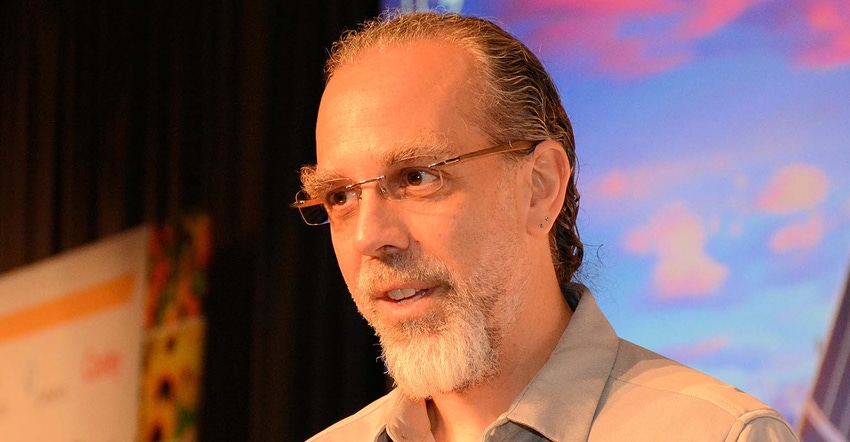
Spotlights dim as 1,300 venture capitalists, startup CEOs, and serial entrepreneurs quiet in the vast conference room at the start of last week’s World Agri-Tech Innovation Summit in San Francisco. A pony-tailed, bespectacled man grins slyly at the audience, as if he knows what he is about to say will set heads spinning.
He begins telling the story of Haber-Bosch, the revolutionary turn-of-last-century process that allowed humans to mass-produce plant fertilizers through ammonia production. It was arguably the most important development in mankind when you think about the planet and its 7.7 billion inhabitants today.
The storyteller is Astro Teller, Captain of Moonshots at Alphabet’s X, the research and development team formerly known as Google X. Yes, his name is Astro, and yes, that is his title. Teller doesn’t just encourage people to think outside the box; he encourages people to think outside the universe. No idea is too audacious.
He asks the audience to imagine those initial discussions way back in 1898.
“Someone must have said, ‘what if we just got fertilizer from the air?” he says. “It may have been a laughable idea, but laughable ideas are what change the world.”
His point: to solve big problems, first share all the ideas – even the ones that seem silly. It’s a take-home point everyone, including farmer-business owners, can learn from.
“Think about when those laughable ideas are proposed in your company - what do you do when someone makes a laughable proposal? Because those laughable proposals are what change the world.”
What’s a moonshot?
Teller ponders big ideas daily. The company’s mission is to create radical new technologies to solve some of the world’s hardest problems.
“What you need for a moonshot is a huge problem that needs to be fixed,” he says. “You also need a radical proposed solution – something that sounds like science fiction.”
A decade ago what was then called Google X took on a big problem: clogged roadways and car accidents, 94% of which are caused by human error made worse today by mobile devices.
“When we proposed driverless cars, it was laughable; not so much anymore,” he says.
Seven years ago, X began working on a network of balloons on the edge of space for broader internet connectivity; that system, called ‘loon,’ now delivers data on multiple continents. ‘Wing,’ an autonomous delivery drone system, can reduce traffic and help ease CO2 emissions. “Now there are literally people all over the world who can get coffee, food, or aspirin from a pharmacy with a drone,” he says.
Some X ideas simply don’t pan out. The team tried making clean fuel from seawater, but in the end, it couldn’t compete with gasoline. They just move on.
“At X we specialize in being laughed at,” Teller says with a smile. “We say, what about this? It certainly won’t work. What about that? It won’t work either. But if you propose thousands of really laughable things and throw them out quickly you can get to the few that really change the world.”
And now, agriculture
Last week X turned its prodigious moonshot thinking toward another weighty problem: world hunger, agriculture, and sustainably-produced food.
“Getting people enough food, in a way that is healthier for them and for the planet, getting it to them faster, inexpensively and so farmers can make a living - we can fix those things,” Teller says.
That process begins with ‘what if’ scenarios. What if we could breed crops 10 times faster, 10 times cheaper? What if we could manage the plant, not the plot?
“There is at least 40% waste in agriculture, money thrown away, why? Because we can’t manage the plants individually,” he says. “It doesn’t seem like we could get away from most herbicides, but you don’t need it on every plant. Why not weed the weeds instead of putting the herbicide down? What if complexity was free and you had a robot there to do that?”
Agriculture went through its machinery intensive stage, then chemistry, and later, biology. Teller’s team believes we’re now entering the era of computational intensive ag.
“How much of that will be robotics making assessments, or robots doing the actual physical work famers used to do?” he asks. “Some version of that is going to be true in the next 10 years.”
Inspire your team
Teller’s message to the San Francisco tech crowd is simple: You don’t have to work at Alphabet X to tackle big problems. So how do you help your people work on something ‘laughable’ – something that may become extraordinary for your business or even the world?
“Your people won’t do anything unless you one, think differently, and two, act differently,” he says.
“If you say, go make a car run for 50 miles on a gallon of gas, fine, I’ll take the engine and fix it up,” he explains. “But if you say, make an engine run 500 miles on one gallon, you have to start over; you can’t just tinker around the edges.
“That starting over mentality is what it takes to make a big breakthrough.”
Teller urges leaders to give team members a purpose and do it with feeling.
“If I say, come work at my place, we’re going to change the world, that’s what gets them in their hearts,” he says. “That’s what makes them work through the night without asking for more money.”
Don’t be afraid to walk away from ideas that don’t work. That way it’s not as expensive to try the laughable ideas. Work on the hardest parts of a problem first.
Lastly, never let failure stop your problem solving. That’s how you get better.
“Don’t think of it as failing; think of it as learning,” he concludes. “You learn because you tried something, and it didn’t work.”
About the Author(s)
You May Also Like






